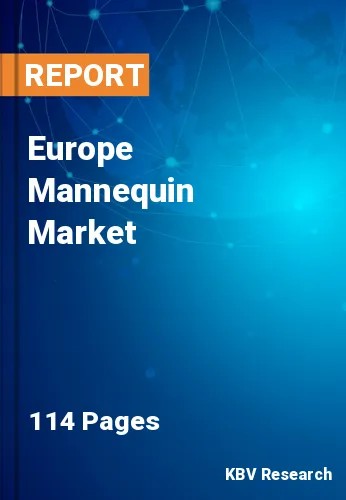The Europe Mannequin Market would witness market growth of 2.5% CAGR during the forecast period (2023-2030). In the year 2020, the Europe market's volume surged to 824.2 thousand units, showcasing a growth of 2.2% (2019-2022).
The growth of the market is intrinsically linked with the increased emphasis on branding and storytelling in the retail and fashion sectors. Mannequins have become not just clothing displays but vehicles for conveying a brand's identity and narrative. This shift has enabled businesses to forge deeper connections with their target audience, fostering brand loyalty and differentiation. Mannequins serve as canvases and storytellers. They help bring a brand's narrative to life through their poses, attire, and stylization. In high-end boutiques, mannequins are dressed to reflect the brand's ethos – sophistication, minimalism, or avant-garde creativity. This storytelling approach extends to large retail chains, where mannequins are dressed to align with the brand's seasonal collections and marketing campaigns.
The impact of increased branding and storytelling is also notable in the fashion industry. Mannequins have evolved from mere display figures to fashion models in their own right. They are dressed to mirror the latest runway trends, showcasing how garments can be styled and layered. This approach engages customers in a comprehensive fashion experience and guides their purchasing decisions.
As per the data from the European Commission, Italy, other southern EU nations (Spain, Greece, Portugal), as well as more recent EU countries (Poland, Romania, Bulgaria, Hungary), have the biggest concentration of fashion manufacturing activities. Italy, France, Poland, and Germany have the highest concentration of fashion distribution and retail enterprises. European workmanship and savoir-faire are highly regarded globally, with high-end European firms selling 62% of their products outside their continent. 74% of the global value of all products in the personal luxury goods category—which includes clothing, accessories, jewelry and watches, leather goods, fragrances, and cosmetics—comes from European sources. Thus, the growing apparel industry in Europe will boost the demand for mannequins in the region.
The Germany market dominated the Europe Mannequin Market, by Country in 2022, and would continue to be a dominant market till 2030; thereby, achieving a market value of $374.3 Million by 2030. The UK market is experiencing a CAGR of 1.6% during (2023 - 2030). Additionally, The France market would exhibit a CAGR of 3.3% during (2023 - 2030).
Based on Product Type, the market is segmented into Women, Men, Children, and Others. Based on Material, the market is segmented into Fiberglass, Plastic, and Others. Based on countries, the market is segmented into Germany, UK, France, Russia, Spain, Italy, and Rest of Europe.
Free Valuable Insights: The Global Mannequin Market will Hit USD 6.4 Billion by 2030, at a CAGR of 3.2%
The market research report covers the analysis of key stake holders of the market. Key companies profiled in the report include Able Art Limited, Genesis Display GMBH, Best Mannequins BV, 3S Mannequins Inc. (Anasys Concept Developers Pvt. Ltd.), IDW Display, EUVEKA, Abstract Mannequins, Hans Boodt Manneqins, Global Mannequins, and Bonaveri Srl.
By Product Type (Volume, Thousand Units, USD Million, 2019-2030)
By Material (Volume, Thousand Units, USD Million, 2019-2030)
By Country (Volume, Thousand Units, USD Million, 2019-2030)
Our team of dedicated experts can provide you with attractive expansion opportunities for your business.

